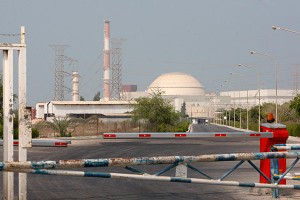 With hopes dimming for a diplomatic end to the Iranian nuclear stalemate in the coming months, some U.S. policy veterans are advising a novel approach to improving ties with the Islamic Republic: showing a little love for ordinary Iranians.
With hopes dimming for a diplomatic end to the Iranian nuclear stalemate in the coming months, some U.S. policy veterans are advising a novel approach to improving ties with the Islamic Republic: showing a little love for ordinary Iranians.A report by a�panel of U.S. experts, which was released Thursday, calls on the Obama administration to engage more directly with the Iranian people, in part to counter increasingly negative attitudes toward Americans following nearly two years of harsh economic sanctions.
The report�warns that the popular resentment toward�the United States is helping Iran�s clerical rulers deflect some of the blame for the country�s economic crisis. Because of this, Iranian officials have managed to limit the public outcry over nuclear policies that placed Iran on a collision course with the West.
�It is time to play chess, not checkers,� said the report by the Iran Task Force of the Atlantic Council, a group that includes�prominent former diplomats and national security officials�from both Republican and Democratic administrations. It faulted U.S. officials for pursuing Iranian policies that have been �mostly about tactics and too little about strategy.�
The report came as diplomats from the United States and five other world powers traveled to Kazakhstan for a new round of nuclear negotiations with Iran. The�last talks in late February�were hailed as �positive� by Iranian diplomats, yet Tehran made no sign of acceding to international demands that it curtail parts of its nuclear program.
In the run-up to the start of the new talks, U.S. and European officials sought to place responsibility for the momentum in the negotiations on Iran. The Islamic Republic is expected to formally respond on Friday to a deal offered five weeks earlier by the so-called P5-plus-1 nations � the United States, Britain, China, France, Germany and Russia. Under the proposal, Iran would agree to limit production of enriched uranium in exchange for minor sanctions relief.
U.S. officials and policy experts predict that Iran will make a modest counteroffer to keep the negotiations alive while deferring any decision on limiting its uranium stockpile. But one senior administration official hinted that the talks might be suspended if Iran appears to be merely stalling for time.
�We�ll be ready to take steps to move forward if Iran is prepared to engage seriously,� the official, who insisted on anonymity in discussing sensitive negotiations, told reporters on Wednesday as the U.S. team prepared to depart for the Kazakh city of Almaty. �If Iran is not prepared to engage seriously .?.?. we will need to evaluate what the next steps should be in this process.�
Western officials and diplomats have downplayed prospects for a breakthrough in Almaty, saying Iran�s leadership will be distracted by domestic politics in the run-up to presidential elections in June.
Indeed, there has been little public discussion of nuclear talks in Iran. In one of a small handful of public pronouncements, Iran�s foreign minister, Ali Akbar Salehi, appeared to put a positive cast on the talks, suggesting that progress was possible because the West has finally concluded that �the Islamic Republic is the most powerful country in the Middle East, so it is (now) trying to turn its confrontational approach into one of interaction.�
Opinion polls have traditionally shown that most Iranians admire Americans, but that support has dropped as Western sanctions drive up inflation and unemployment. The Atlantic Council report suggested the trend could be reversed with well-targeted policies that ensure that ordinary Iranians have access to humanitarian goods as well as student visas and other programs that promote cultural exchanges between the two countries, the report said.
By The Washington Post
The Iran Project is not responsible for the content of quoted articles.










